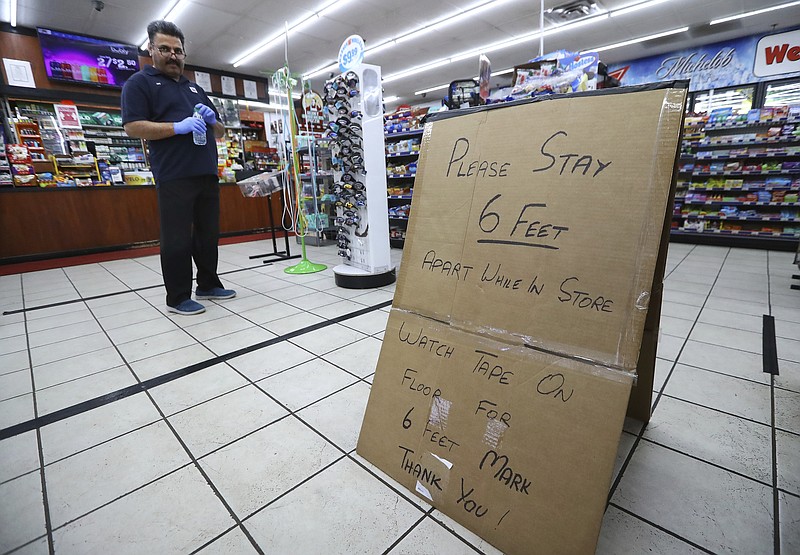For answers to frequently asked questions about the coronavirus, click here.
ATLANTA (AP) - Deaths and the number of confirmed COVID-19 cases in Georgia continued to increase Saturday, even as lawmakers tried to grapple with what the respiratory illness will mean for state finances.
State House Speaker David Ralston and the top budget writers in the House and Senate say efforts to cut income taxes or increase pay for teachers or other state employees are probably dead for this year. They all assume state revenues for the upcoming budget year beginning July 1 are likely to dive from previous projections, and say even the patched-up budget for the rest of this year may overflow again in red ink.
"I think the initiatives we talked about in the version we passed are not going to go forward," Ralston, a Blue Ridge Republican, told The Associated Press on Friday. "That includes the teacher pay raise and the 2% merit raise (for other state employees) and the tax cut."
The number of deaths in Georgia from the disease caused by the new coronavirus rose to 69 at noon Saturday, more than doubling in four days, according to data from the state Department of Public Health. The number of confirmed infections rose to 2,366, more than doubling in three days. Cases were reported in 108 of Georgia's 159 counties.
Because of the scarcity of tests and a lag in results for tests already administered, infections in Georgia are higher than the state total.
For most people, the new coronavirus causes mild or moderate symptoms, such as fever and cough that clear up in two to three weeks. For some, especially older adults and people with existing health problems, it can cause more severe illness, including pneumonia and death.
The outbreak, on a per-capita basis, continued to be most severe in southwest Georgia. Dougherty County, which includes Albany, reported 205 cases. That's behind Fulton County's 373 cases and DeKalb County's 240 cases in total numbers. But on a per-capita basis, according to AP calculations, Dougherty County has a confirmed infection rate that remains 10 times as high as the statewide numbers. Of the state's top 10 counties in per-capita infections, eight are in southwest Georgia, and 23 of the state's 69 deaths are in that region. Lee County, with five deaths, has a death rate 25 times the state as a whole.
Lawmakers have already had a close encounter with the coronavirus, with at least five senators and one House member sickened. Ralston has been in self-quarantine in Atlanta, saying he did not want to expose family members at home in north Georgia. Lawmakers were considering planning a return to the capitol around April 15 after they suspended the session in mid-March. But Ralston and others say that's now probably too soon.
"Members have a lot of concern about the public health risk of assembling at a time when community spread is very high," said House Minority Leader Bob Trammell, a Luthersville Democrat.
A delay is OK by House Appropriations Committee Chairman Terry England and Senate Appropriations Committee Chairman Jack Hill, both Republicans. They say they have been in close communication with Gov. Brian Kemp's administration, but said projecting revenues for the upcoming year is nearly impossible until some more tax data comes in. Setting the revenue estimate is Kemp's job, but a spokesman deferred last week on a request to speak to Office of Planning and Budget Director Kelly Farr.
"Nobody knows what we're up against," said England, who's from Auburn. March sales tax numbers, for example, won't be available until late April, and those could be temporarily propped up by panic buying. Lawmakers have until June 30 to pass a budget, but Hill said they're likely to pass a stripped-down budget before then "and be prepared to revise it."
"It's going to be reminiscent of the budgets in the recession," said Hill, who's from Reidsville. Those spending plans saw deep cuts, with many state services saved from total elimination only by big infusions of federal aid.
There could have to be further revisions to the revised budget Kemp signed for the current year, which cut $159 million amid already slowing revenues. That spending plan took $100 million out of Georgia's $2.8 billion savings account, but England and Hill said revenue may fall short again.
And other ambitious proposals are likely to die in a drastically foreshortened remainder of the recession, almost everyone agrees. When asked what else is essential to pass, Ralston answered "Frankly in my mind, not a lot."
